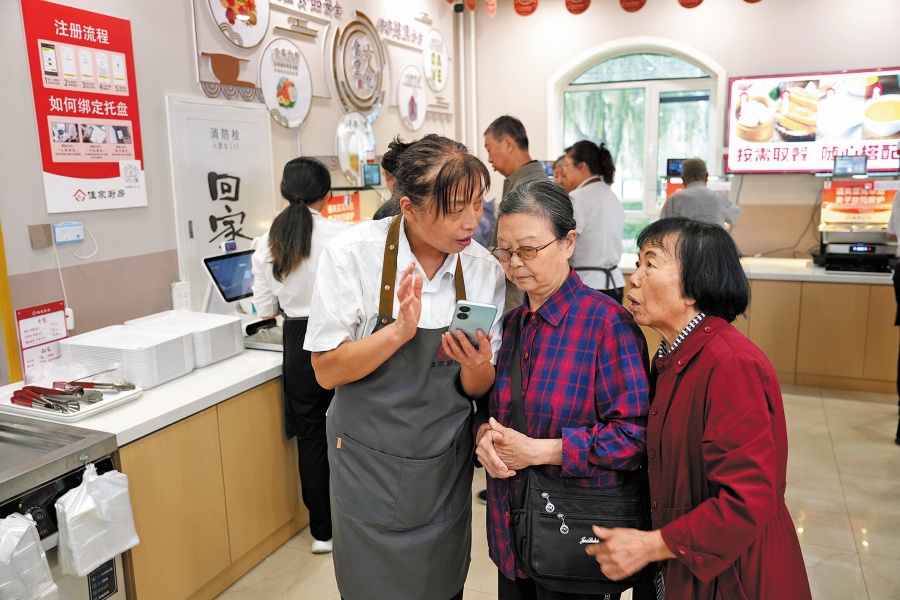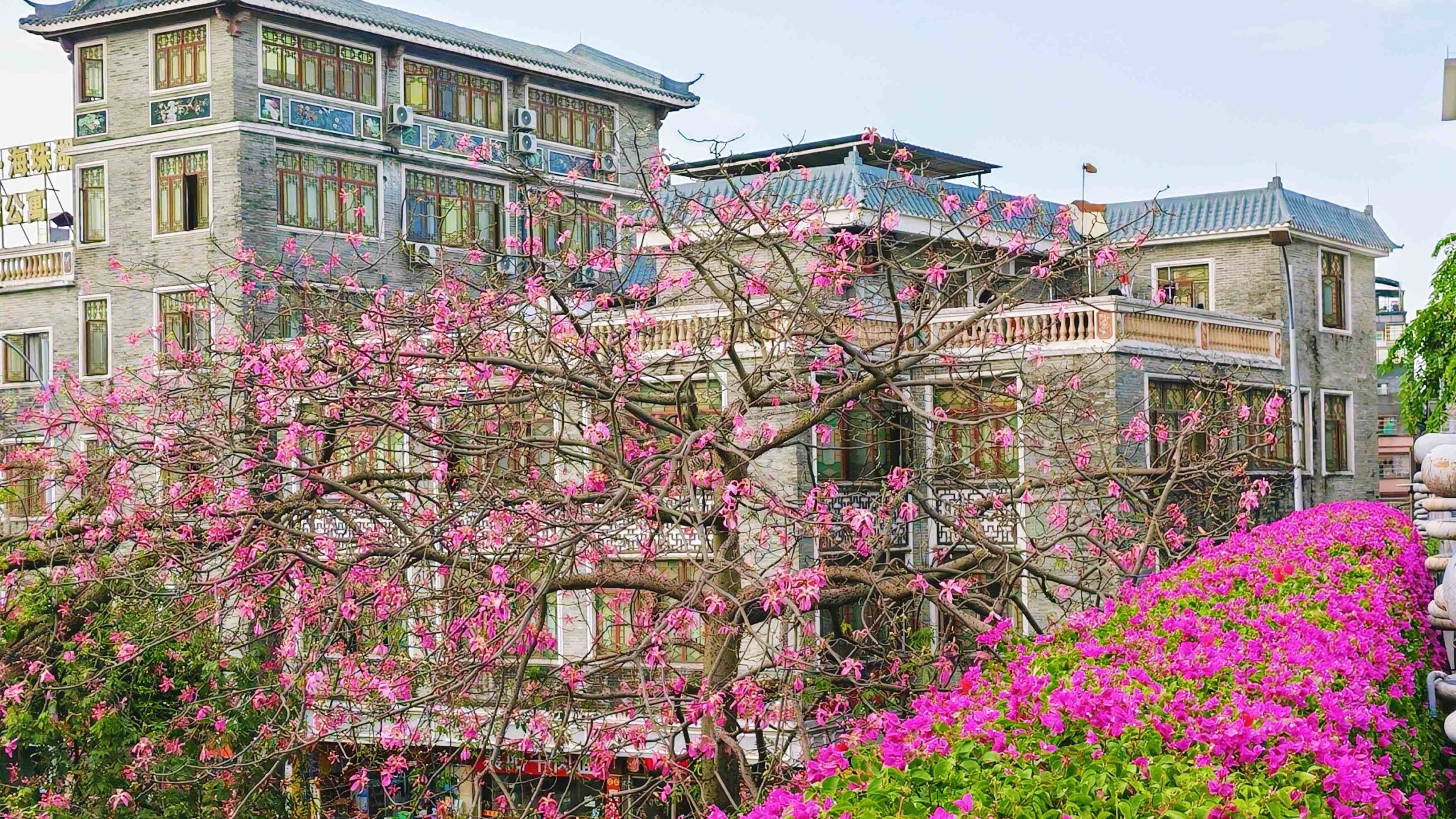Canteens for seniors feed demands of aging population

A staff member shows residents how to make easy payments on a mobile phone at a community canteen in Lanzhou, Gansu province, on Sept 11. (MAO JIANJUN/CHINA NEWS SERVICE)
It's lunchtime, and the canteen in a residential community in Hangzhou, Zhejiang province, is buzzing with excitement. Inside, a tempting array of freshly cooked dishes awaits the elderly residents of the neighborhood.
A message flashes across a screen as one senior enters — "Mr. Chen, seafood and soy products aren't suitable for you today". Personalized reminders appear on the screen for certain residents, and offer meal suggestions based on their health data.
The canteen for seniors in Cuiyuan No 1 Community, one of the first government-subsidized dining halls for elderly people in Zhejiang, offers discounted meals and delivery services for senior residents.
The community is home to over 9,800 people, a quarter of whom are aged 60 or above. As the dietary needs of the seniors have evolved, so has the canteen's technology.
"Our canteen has become much smarter," said Xiang Feifei, director of the community residents' committee.
"For seniors who require special care, the daycare center monitors their vital signs and feeds this data into the canteen's digital system. If someone is allergic to seafood, the system detects it and generates a customized menu advising them what to avoid," she said.
To protect privacy and ensure security, facial recognition and health data usage are governed by a privacy agreement. Both elderly residents and their children sign this agreement, ensuring the data is used only with their consent and strictly for non-commercial purposes, Xiang said.
The initiative not only improves the quality of life for the elderly, but also provides crucial support for younger family members, including those who have to work during the day and are unable to look after their parents at all times.
For 66-year-old Hu Huali, her visits to the community's seniors canteen, which is just a five-minute walk from her home, have become a part of her daily routine.
"I love the Dongpo pork and braised beef here. The meat is so tender and flavorful," she said. "A hearty meal with one meat dish and two vegetable sides costs around 16 yuan ($2.25). It's delicious and affordable."
Chen Peng's parents, both of whom are nearing 80, enjoy three discounted meals a day from Monday to Friday.
"In the past, their meals were often makeshift — flatbread and fried dough in the morning, boiled porridge with pickled vegetables — sometimes they would eat like that all day," Chen said. "We were really worried."
Now, this burden has been eased. "For elderly people like my parents, they can enjoy hot, affordable meals and have someone to chat with, which helps alleviate loneliness," he added.
Guidance funds
China, like many other countries, is undergoing a demographic shift. The country has nearly 300 million citizens aged 60 or above, official figures show. That number is expected to top 400 million by 2035 and approach 500 million by around 2050, at which point seniors will account for nearly 35 percent of the country's total population.
At present, about 90 percent of elderly people in China choose home care, about 7 percent rely on community care, and 3 percent live in institutional care, survey data from the National Health Commission shows.
In October last year, the State Council executive meeting reviewed and approved an action plan for actively developing elderly meal assistance services.
This year, it was included in the China National Aging Committee's list of practical matters for the elderly, with the central government allocating 300 million yuan in guidance funds to support the development of assistance services to provide meals for the elderly.
In September, an official from the Ministry of Civil Affairs said at a news conference that the Communist Party of China Central Committee attaches great importance to these assistance services.
Provinces and regions around the country have been exploring service models based on their own financial capabilities and actual circumstances.
Chuxin Canteen in Hujia village, Dalian, Liaoning province, is one of many new venues providing delicious, nutritious meals to the elderly. At lunchtime, the canteen is the most popular place among the elderly in the village.
The daily menu features both hot and cold dishes, including meat and vegetarian options, along with several choices of staple foods. Since it opened in July, the canteen has won praise from the village's seniors for being clean and convenient, and offering affordable and delicious meals.
"For most of the elderly in the village, their children work and live in urban areas. Their daily meals have become a major concern," said Hu Jin, the Party chief of the village in Shuangdaowan sub-district of Dalian's Lyushunkou district.
"The canteen has addressed this problem."
Chewing over issues
While senior canteens have won widespread approval, questions have been raised over meal management, inappropriate food choices, overcrowding, and inadequate services, highlighting the need for improvement in some areas.
"In the canteen for the elderly near my home, it is not exclusively open to the elderly," remarked one resident who frequents a community canteen in Shahekou district, Dalian.
"During lunchtime, they simply cannot compete with the younger crowd. Has this 'elderly canteen' lost its original purpose?" the resident asked.
At another meal facility for the elderly in nearby Zhongshan district, several seniors are preparing to leave after circling the venue while young people line up for food.
"The dishes with fried meat, fried chicken, and peanuts are abundant," one of the seniors said. "Our teeth are not in good condition, and we cannot chew them. I don't think such dishes meet the dietary needs of the elderly."
Earlier this year, Dalian announced its key livelihood projects for 2024, which included enhancing basic care services for the elderly in homes and communities.
The work includes a concerted effort to develop meal assistance services for the elderly, with the aim of establishing 100 canteens and meal assistance facilities for seniors throughout the city.
The city already has 78 such facilities, with the total number set to reach 100 by the end of the year, the Dalian Civil Affairs Bureau said.
In response to the issues faced in seniors canteens, a bureau official said some of them will be addressed in upcoming regulations. The official, who chose to remain anonymous, conceded that meal assistance services for the elderly require higher standards of management.
In practical terms, factors that need to be taken into consideration are the size of a community's elderly population, their dietary requirements, and the reach of a designated service area.
Existing catering resources also need to be assessed to see whether they can be used in combination with new facilities, while local conditions, planning and appropriate seating arrangements for elderly diners have to be taken into consideration.
Relevant local departments, such as those overseeing market regulation and civil affairs, should regularly inspect prices, food quality and safety, as well as the use of government subsidies. Representatives of the elderly and other age groups should also be encouraged to inspect the services, and address reasonable demands in a more timely and effective manner.
Wang Changqing, a member of Zhongshan district's political consultative conference, said that innovations should be made in the organizational form, service model, and operational mechanism of elderly meal assistance.
Also, full use should be made of existing service resources, facilities, logistics networks, and information platforms, while balancing the public welfare and commercial aspects of elderly care services.
Aging gracefully
Almost one-quarter, or 22.1 percent, of elderly people require meal assistance services, making such services a critical aspect of home-based care, according to a Ministry of Civil Affairs survey.
In response to this data, the ministry and several other government bodies released an action plan in October last year to significantly increase the coverage of meal assistance services across the country by the end of 2025.
Seniors canteens have been popping up across the country in recent years.
Southwest China's Chongqing municipality has already established nearly 1,600 senior canteens, which are expected to serve over 1.8 million people annually.
In Zhengzhou, the capital of central China's Henan province, plans are underway to open 600 meal facilities for seniors by the end of the year, aiming to cover 40 percent of urban communities and 10 percent of rural villages.
Senior canteens are part of China's efforts to boost home-based and community-based elderly care services. Other measures include issuing supportive policies, offering subsidies, attracting private capital, and training talent, said Wu Lijuan, an associate professor in the Department of Sociology at Peking University.
In July, over 300 measures were unveiled at a key Communist Party of China leadership plenum to push for deeper comprehensive reform, with the plenum pledging to develop community-based facilities to improve the supply of basic elderly care services.
"The Chinese government's emphasis on elderly care aligns with the long-standing tradition of respecting the elderly and practicing filial piety," Wu said.
Xiang from the Cuiyuan No 1 Community said: "We often say that caring for our children is caring for the future of our country. In fact, taking care of our elderly is about caring for each of our own futures."
"By creating age-friendly communities, we ensure that no one has to fear growing old," she added.
Xinhua and Dalian News Media Group contributed to this story.
Photos
Related Stories
- Remarkable achievements in population aging-related work made in China: Ministry of Civil Affairs
- Cambodia-China gastronomy week captivates food lovers
- Catering to Chinese palates with light meals, full flavors
- Commentary: Zero hunger remains challenging
- Health-conscious young Chinese reshaping industry
Copyright © 2024 People's Daily Online. All Rights Reserved.









